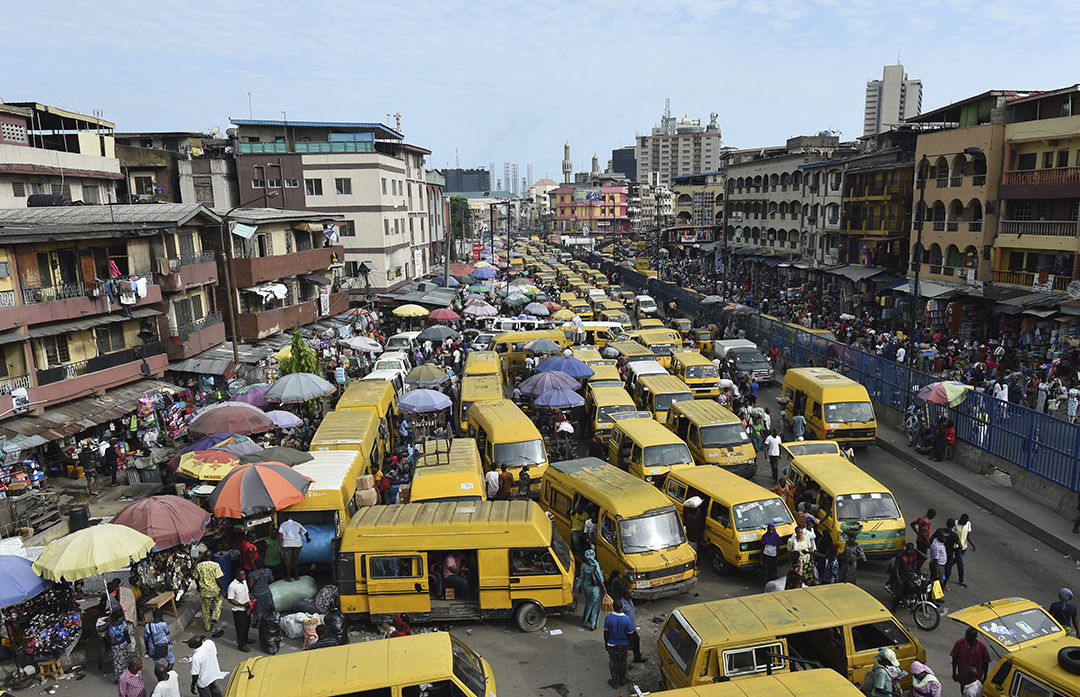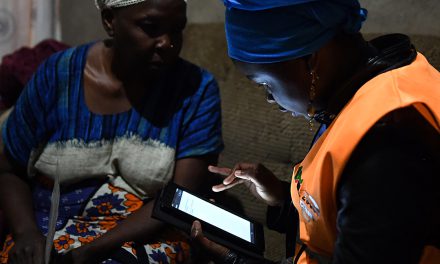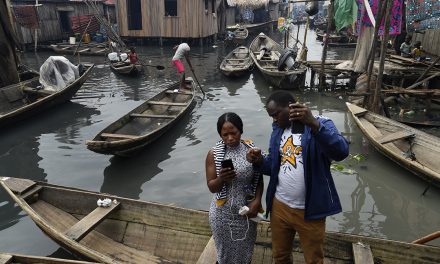
Public transport minibuses popularly called “danfo” barricade the roads in search of passengers and causing a traffic gridlock at Idumota in Lagos on 10 May 2017. Photo: Pius Ekpei/AFP
Good, reliable statistics are essential for measuring progress in reaching development goals and providing essential information about the effectiveness of policies and programmes, according to Eurostat, the statistical office of the European Union.
In an interview with Africa in Fact, Dr Bruce Byiers, the head of programme for African institutions and regional dynamics at the European Centre for Development Policy Management (ECDPM), described good, transparent, and reliable statistics as data generated in a consistent and independent way as per internationally agreed conventions, for example on national accounts, without political interference, and which are made available for the public to use and analyse.
However, in Africa, a continent that generates less than 1% of the world’s research, reliable data as Byiers defined is either seriously lacking or weak, outdated, and untrustworthy. As the Africa Data Revolution Report 2018 notes: “Due to a lack of information on government agency websites, it may be hard to understand which government agency is producing or holding certain data.
“Among national statistics, vital statistics are often not provided by statistics offices, and in some cases, vital statistics indicators are extrapolations from population censuses and, as such, not reflecting an actual register.
“Overall, environmental data remains one of the least commonly provided data groups, with air pollution and water quality data being particularly rarely produced beyond smaller administrative zones,” states the report.
In the 2019 edition of the Oxford Research Encyclopaedia of Politics, Professor Morten Jerven points out that when statistics are based on missing data, the estimates will invariably be soft, and therefore malleable. “Thus, when incentives are clearly identifiable before reporting or aggregation, the final estimates may be biased,” Jerven writes.
Poorva Karkare, ECDPM policy officer, Economic and Agricultural Transformation cluster, told Africa in Fact that in many cases, African countries, especially their governments but also civil society at large, simply do not have access to data that they need for making informed policies.
“This may be because the required data are simply not there (due to lack of funding, among other things), not shared with the public (because some data, especially on census or other politically sensitive topics, is classified), or simply not taken into account even if someone has come up with the data,” she explained.
In a report titled The Value of Data for Development, published in October 2017 by OECD’s New Approaches to Economic Challenges Unit, senior advisor William Hynes underlined the value of data and statistics, which he said provided the essential basis for understanding the practicalities of the development process, the interactions and feedbacks between different systems, and the factors that should shape decisions.
Byiers echoed Hynes’s sentiments: “At one level, it would seem vital in order to have a basis for policy decisions, for identifying problems, for example, low export growth, and more monitoring progress when policies are put in place.”
The Netherlands-based expert told Africa in Fact that beyond that basic point, the Sustainable Development Goals (SGDs) are very much about achieving targets, for which data are necessary to say whether they were being achieved.
As Karkare reiterated: “To give a simple example, without data on available stocks (it could be number of people, the number of roads, food security), future planning (how many schools are needed, how much infrastructure to close the gap, or food imports) becomes difficult, and policies need to be made in the dark. This has a direct impact on making efficient planning in the face of finite resources available for the government.”
Data are also vital for answering larger questions about the development process: identifying the factors behind differential rates of growth, development and wellbeing have been central questions of development economics, according to Hynes.
Yet, while good data help improve policies and strengthen monitoring, they can also be tampered with for propaganda and populist purposes, and political manipulation, especially where democracy is weak, dictatorship reigns and censorship thrives.
“Governments are run by politicians whose interests are maintaining power and not necessarily giving a truthful picture to the world regardless of repercussions,” said Shepherd Mpofu, Professor of Media, Culture and Communications at the University of Limpopo in South Africa. “They manipulate, especially negative, data that exposes government and leadership failures to save face. In some cases, manipulation could be seen as a political campaign strategy meant to keep the incumbents in power.”
According to Byiers, the point is that statistics can always be interpreted in diverse ways, depending on how one presents them, the story one attaches to them, or how one frames the discussion around them. “So even with ‘reliable’ data, politicians everywhere are guilty of misrepresenting what data actually say, or purposefully misrepresent them,” he said.
“Just think of Covid-19 cases and deaths,” he added. “When these went the wrong way, it put a lot of governments and politicians in trouble as they were considered not to be protecting their people.”
As Karkare also said: “Consider why countries sometimes do not want to publish census data (it may have implications for ethnic distribution among the population). Data can be manipulated not just to serve the interests of the ruling party, but also the opposition or civil society with the aim of serving their narrow goals.”
Stressing the need for an independent but central public body that collects data (central statistical office), she added, “Sometimes, even if there are no such narrow interests, the collected data are just not reliable simply because of a lack of capacity.”
Due to the lack of reliable data in Africa, and mindful of the hazards of government-manipulated data, journalists working on the continent seek what they often describe as “independent” and “objective” data, mostly relying on data supplied by the UN and its agencies, the World Bank, the IMF, and western NGOs and think tanks.
But as Byiers pointed out, “Most UN, World Bank, OECD and IMF data is based on government data in any case. Economic data, for example, must come from somewhere, and central banks and statistical offices are the best placed.”
What those organisations do, he said, was conduct their own checks on whether the data makes sense, or meets international criteria. “I believe [that data] is independent, as there is less at stake politically for those organisations. Furthermore, they can be more reliable in that they often include more triangulation with other data sources – for example, UN Comtrade data showing trade as imports and exports, which can then be compared.
Karkare cautioned that a “lack of confidence in government, for whatever reason, including data manipulation, cannot be a reason to substitute government with multilateral agencies. If you followed the recent World Bank’s ‘doing business’ scandal, for example, it in fact demonstrated that these ‘analyses’ are not exactly unbiased and objective either.”
But if Africa’s autocratic regimes tamper with data to suit their political agendas – as Rwanda did in 2015, when the country was accused of manipulating the latest official statistics to indicate poverty levels were going down when source data suggested it was going up – observers question if the continent will achieve its development goals and make it to the finish line of the data revolution in the process.
“I would separate achieving development goals from data,” Byiers told Africa in Fact. “Even though data are important, even at their best they are only a numerical representation of real things.
“So yes, the goals can be achieved, even with bad data, but it just means that policies will be less well based on regular and consistent data, which would arguably make approaches more effective and targeted.”
“Development can be achieved in some cases even when data are not available,” Karkare agreed. “At the same time, data availability does not mean that development follows a logical conclusion. Data, however, can help in informed policymaking, which in turn can get a country closer to its development goals.”
[activecampaign form=1]
Kinshasa-born Issa Sikiti da Silva is an award-winning freelance journalist. Winner of the SADC Media 2010 Awards in the print category, he has travelled extensively across the African continent. He lived in South Africa for 18 years, where he worked for 10 years as a journalist before leaving for West Africa, and later to East Africa, to work as a foreign correspondent. He is currently based in Nairobi, Kenya.












